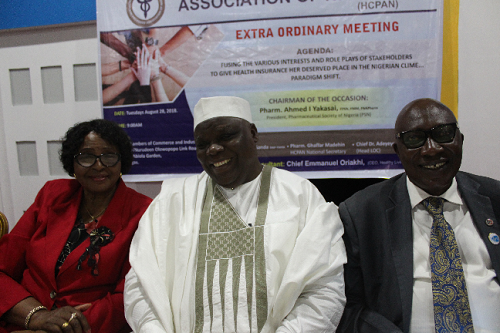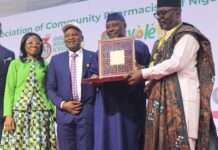– As AGPMPN decries marginalisation of private hospitals
Dr Umar Sanda, president, Healthcare Providers Association of Nigeria (HCPAN), has declared that delay in the passage of the current bill on the National Health Insurance Scheme (NHIS) Act at the National Assembly is having a negative effect on healthcare providers in the country.
Speaking at HCPAN’s Extraordinary General Meeting held recently at Lagos Chambers of Commerce and Industry (LCCI), Alausa, Lagos, Sanda disclosed that there was a nationwide lull in health insurance, which he described as quite worrisome.

According to him, “Nothing is moving positively in the nation’s health insurance. Even the HMOs have been inactive for some time and providers are feeling the pinch. That was why we called for this emergency general meeting to dissect the problem and come up with a solution.
“We are in a democracy where the rule of law applies. As long as this 8th National Assembly does not pass the new law on health insurance, we cannot move forward. That bill has been there for eight months and nobody is paying attention to it. We must get a legal backing for what we do to satisfy the HMOs, providers and relevant stakeholders.”
While noting that the bill had passed its second reading before being sidelined at the parliament, Sanda stressed that the new Act must make NHIS mandatory for people to access affordable healthcare across the country.
“After this meeting, the communique will be passed on to the relevant authorities – the presidency, the National Assembly and the state governments – to review,” Sanda said, adding that “universal health coverage can only be achieved when the NHIS is made compulsory. That is why I said passage of the bill is very important.”
In a related development, Dr Ugwu Iyke Odo, president, Association of General Private Medical Practitioners of Nigeria (AGPMPN) has taken a swipe at tertiary institutions’ dominance of the health insurance scheme.
Odo, who described the situation as an anormaly, repeatedly declared that teaching hospitals and, by extension, federal medical centres, had no business with a private sector-driven initiative like the NHIS, which is over 70 per cent about primary care.
“In primary care, we are talking about private hospitals mostly because we dominate over 70 per cent of these services. Essentially, over 70 per cent of the ill-health that bring people to the hospitals are covered by 70 per cent.
“Twenty per cent is secondary care and only about 10 per cent is required to be sent to the tertiary institutions like the teaching hospitals. That is the referral system,” he emphasised.
The AGPMPN boss further noted that even in the United Kingdom, the NHIS is an essentially private sector-driven programme and should therefore be designed to allow the right people to do their job.
“Sadly, the reverse is the case in Nigeria today. Teaching hospitals and the federal medical centres dominate here. They have almost 80 per cent of the enrollees.
“And where capitation is paid on health scheme, it always depends largely on the population of the patients. By our own scheme in Nigeria, we have recommended N750 capitation. The minimum number of patients a facility should have to break even is 5,000. Only teaching hospitals and FMCs have this number,” he said.
Speaking further, Odo remarked that over 90 per cent of private doctors cannot boast of the 5,000 mark, arguing that many have only 10, 50 or 100 patients at the most.
“In this case, the money is gone after treatment of the first two patients. For every other patient you treat, it means you are spending your own money. That is why doctors are poor.
“Until we meet universal coverage where every provider will be guaranteed that minimum critical number, we should revert to fee-for-service so that even if you have two patients, you can make 20 kobo to keep body and soul together,” he explained.
On his part, Pharm. Ahmed Yakasai, president, Pharmaceutical Society of Nigeria (PSN), wondered why Nigeria was still struggling with health insurance, long after its introduction.
“I agree that the NHIS Act needs to be reviewed. If countries like Ghana cover 70 per cent of their populations, and Rwanda that is just recovering from years of genocide covers over 90 per cent, what is the problem with Nigeria?” he quizzed.
Yakassai however expressed optimism in the strong representation of healthcare players under HCPAN, adding that the presence of professionals like medical lab scientists, physicians and pharmacists in its membership says a lot about the association’s collaborative stance.
“I believe synergy is a must and not an option. It should form the core of our larger society. In order for the Nigerian masses to have access to quality and affordable healthcare, NHIS has to be on its feet and rise up to the occasion,” he charged.













